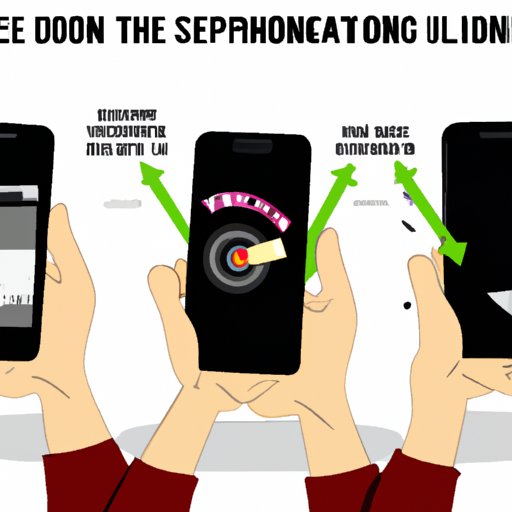Introduction
Phone addiction is a real issue that affects many people in the modern world. The rise of smartphones has made it even easier to become addicted to our phones, as we are constantly bombarded with notifications and alerts from social media, text messages, emails, and other apps. This constant connection can have a negative impact on our health, relationships, and productivity, making it important to manage and overcome phone addiction.
In this article, we will discuss the definition of phone addiction and its impact, as well as provide an overview of strategies to help manage and overcome phone addiction.
Limiting Phone Usage
One of the most effective ways to reduce phone addiction is to limit your phone usage. This means setting specific time frames for using your phone and avoiding using it when it is not necessary.
Setting Specific Time Frames
The first step to limiting phone usage is to set specific time frames for when you can use your phone. For example, you may decide that you will only use your phone for 30 minutes in the morning and 30 minutes in the evening. During these time frames, you should avoid using your phone for anything that is not necessary or productive.
Turning Off Notifications and Alerts
Another way to limit phone usage is to turn off all unnecessary notifications and alerts. This includes notifications from social media, text messages, emails, and other apps. You can also turn off any vibrations or sounds that alert you to incoming messages. Doing this will help reduce the temptation to check your phone constantly.
Deleting Unnecessary Apps
Lastly, you should delete any unnecessary apps from your phone. If there are certain apps that you find yourself checking frequently, but do not really need, consider deleting them from your phone. This will help reduce the temptation to use your phone unnecessarily.
Reducing Accessibility
Another strategy to help manage and overcome phone addiction is to reduce the accessibility of your phone. This means storing away your phone during certain times of the day or replacing phone use with other activities.
Storing Away the Phone
One way to reduce the accessibility of your phone is to store it away during certain times of the day. For example, you could choose to store your phone away while you are at work, while you are eating meals, or while you are spending time with family and friends. This will help reduce the temptation to use your phone unnecessarily.
Replacing Phone Use with Other Activities
Another way to reduce the accessibility of your phone is to replace phone use with other activities. This could include reading a book, going for a walk, or engaging in a hobby. By replacing phone use with other activities, you will be less likely to reach for your phone when you are bored or have nothing else to do.
Making a Conscious Effort
Finally, it is important to make a conscious effort to manage and overcome phone addiction. This means being present and paying attention, as well as practicing mindfulness.
Being Present and Paying Attention
It is important to be present and pay attention when you are interacting with other people or engaging in activities. This means avoiding checking your phone when you are talking to someone or when you are doing something else. Doing this will help reduce the temptation to use your phone unnecessarily.
Practicing Mindfulness
Finally, it is important to practice mindfulness when it comes to managing and overcoming phone addiction. This means being aware of when you are reaching for your phone and why you are reaching for it. It also means taking a break from your phone if you find yourself using it too much. Doing this will help you become more mindful of your phone use and will help reduce the temptation to use it unnecessarily.
Conclusion
Phone addiction is a real issue that affects many people in the modern world. In this article, we discussed the definition of phone addiction and its impact, as well as provided an overview of strategies to help manage and overcome phone addiction. These strategies include limiting phone usage by setting specific time frames, turning off notifications and alerts, deleting unnecessary apps, reducing accessibility by storing away the phone, replacing phone use with other activities, and making a conscious effort to be present and pay attention, as well as practice mindfulness.
By following these strategies, you will be able to manage and overcome phone addiction and reduce the negative impact it can have on your health, relationships, and productivity. Staying committed to change is key, so remember to stay focused and stay positive!
(Note: Is this article not meeting your expectations? Do you have knowledge or insights to share? Unlock new opportunities and expand your reach by joining our authors team. Click Registration to join us and share your expertise with our readers.)
